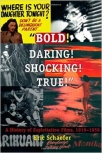In 1957 two books were published that were destined to have long-lasting effects on American society, long exceeding the lives of their writers. One was On the Road by Jack Kerouac (see December's Book of the Month, which turned half the members of two generations into late-period Beatniks, transitional "Fringies" and ultimately, Hippies. The other was Atlas Shrugged by Ayn Rand, which turned the other half into radical libertarians, anti-government conservatives, and today's Republican Party. Even the erstwhile 2012 Republican VP candidate, Paul Ryan, cited the book as a seminal work in the development of his world view.
Who is John Galt? That's the annoyingly-repeated question scattered throughout the first two thirds of Atlas Shrugged, and it is just as annoyingly repeated on the waving placards of the Teabaggers at their rallies (see here for example).
So then, who is John Galt? It turns out that he is a one-man larger-than-life beacon of hope for the producing class, the industrialists, the captains of industry, i.e., the "makers", standing firmly against the onslaught of collectivism as promoted by lazy slacker socialist parasites intent on sharing the wealth, i.e., the "takers".
Does that ring a bell? It's the spirit – and some of the words – behind Mitt Romney's now-infamous "47%" speech at an expensive fundraiser attended by the "makers", and surreptitiously filmed by a "taker".
It's a long book and it's hard to get through. It's chock full of leaden prose and wooden dialogue from two dimensional characters plodding through unrealistic situations, all of it larded over with a stomach-churning mess of sophomoric half-baked "philosophy" that decries collective action, exalts the producing class over the parasites, and culminates in a "strike" by the capitalist industrialists which firmly reestablishes its control over the masses. (I will admit, in the spirit of full disclosure, that I have not actually read the entire book. But in the timeless words of the well-known literary critic John Simon, "How many spoonfuls of rotten stew do you need before you know the whole batch is spoiled?")
Although the action in the book is supposed to reflect the United States at some point in 1957's future, it depicts a society that is almost completely foreign to the America we know; it's actually a weird kind of science fiction, but without the science part.
She called her philosophy Objectivism, which she describes as "rational self-interest". As she explains in the pages of Atlas Shrugged, "My philosophy, in essence, is the concept of man as a heroic being, with his own happiness as the moral purpose of his life, with productive achievement as his noblest activity, and reason as his only absolute." [Emphasis added]. That doesn't leave much room for the great unwashed masses, the "takers" she decries as virtual parasites living off the wealth of the "makers".
This philosophy can have a profound resonance with those who already think of themselves as The Elite. In the cold hard facts of reality, however, it can be boiled down to the deathless words of Gordon Gecko in the movie Wall Street: "Greed is good."
Ayn Rand herself was a bundle of contradictions, an anti-collectivist who decried Social Security for its socialism, but ended up depending on it herself in her old age. A hero to the Religious Right who was herself an atheist. A Russian-born rabid critic of the Soviet Union who nevertheless exercised a Stalinist control over her own followers.
Ayn Rand died in 1982 but her influence on a certain segment of the population has never waned. If anything, it's gotten stronger. Unfortunately, and ironically, despite her paramount reliance on rational thought, the current followers of the Ayn Rand philosophy are anything but rational. We see it all the time in the party of climate change deniers, young-earth creationists and historical revisionism.
In the words of a popular t-shirt slogan, "You can't argue with crazy". Instead of trying to reason with these people, we'll all be better off by continuing to organize our own party and establish our own permanent majority. After we've elected enough Democrats to office at the local, state and Federal levels, the Republicans and their Ayn Rand philosophy will be cast out into the dustbin of history.
Thursday, January 24, 2013
Who is John Galt? The Pernicious Influence of Ayn Rand
Posted by Farnsworth68 at 2:49 PM
Labels: Atlas Shrugged, Ayn Rand











0 Comments:
Post a Comment